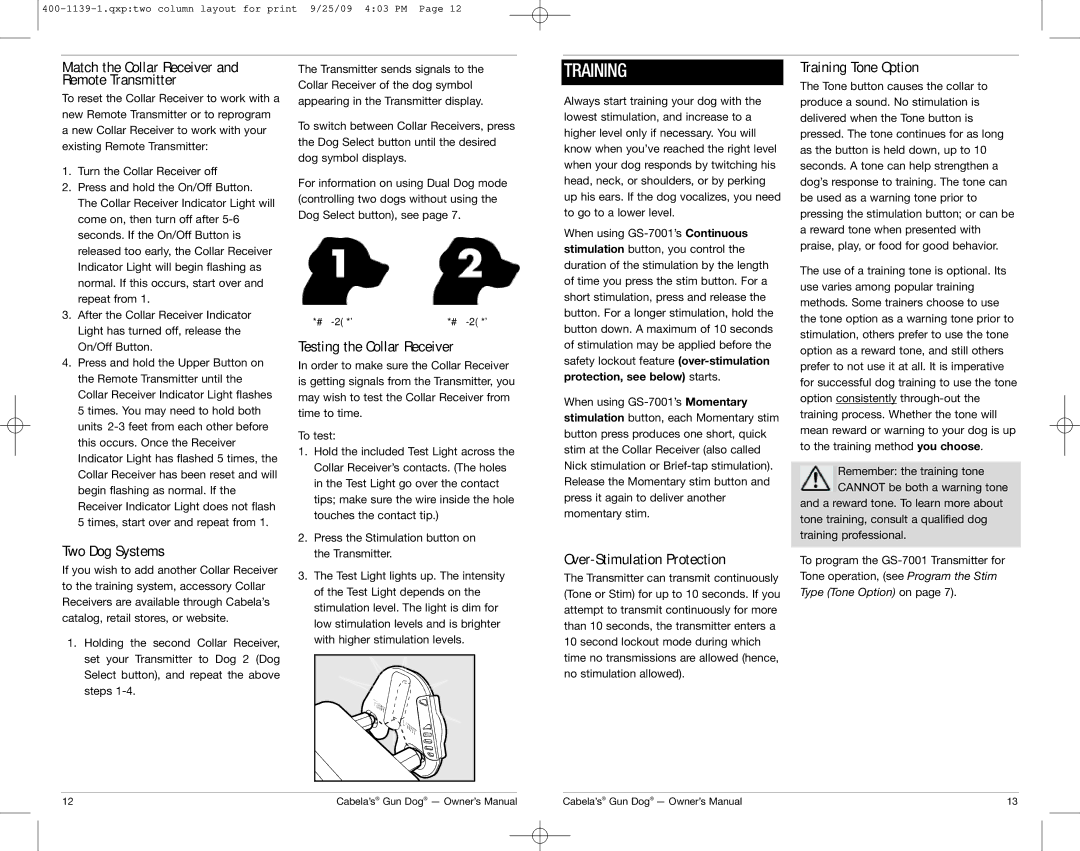
Match the Collar Receiver and Remote Transmitter
To reset the Collar Receiver to work with a new Remote Transmitter or to reprogram a new Collar Receiver to work with your existing Remote Transmitter:
1.Turn the Collar Receiver off
2.Press and hold the On/Off Button. The Collar Receiver Indicator Light will come on, then turn off after
3.After the Collar Receiver Indicator Light has turned off, release the On/Off Button.
4.Press and hold the Upper Button on the Remote Transmitter until the Collar Receiver Indicator Light flashes 5 times. You may need to hold both units
Two Dog Systems
If you wish to add another Collar Receiver to the training system, accessory Collar Receivers are available through Cabela’s catalog, retail stores, or website.
1. Holding th e sec ond Collar Receiver, set your Tr ansmitter to Dog 2 (Dog Select b utton), and r epeat th e above steps
The Transmitter sends signals to the Collar Receiver of the dog symbol appearing in the Transmitter display.
To switch between Collar Receivers, press the Dog Select button until the desired dog symbol displays.
For information on using Dual Dog mode (controlling two dogs without using the Dog Select button), see page 7.
Dog 1 symbol | Dog 2 symbol |
Testing the Collar Receiver
In order to make sure the Collar Receiver is getting signals from the Transmitter, you may wish to test the Collar Receiver from time to time.
To test:
1.Hold the included Test Light across the Collar Receiver’s contacts. (The holes in the Test Light go over the contact tips; make sure the wire inside the hole touches the contact tip.)
2.Press the Stimulation button on the Transmitter.
3.The Test Light lights up. The intensity of the Test Light depends on the stimulation level. The light is dim for low stimulation levels and is brighter with higher stimulation levels.
TRAINING
Always start training your dog with the lowest stimulation, and increase to a higher level only if necessary. You will know when you’ve reached the right level when your dog responds by twitching his head, neck, or shoulders, or by perking up his ears. If the dog vocalizes, you need to go to a lower level.
When using
When using
Over-Stimulation Protection
The Transmitter can transmit continuously (Tone or Stim) for up to 10 seconds. If you attempt to transmit continuously for more than 10 seconds, the transmitter enters a 10 second lockout mode during which time no transmissions are allowed (hence, no stimulation allowed).
Training Tone Option
The Tone button causes the collar to produce a sound. No stimulation is delivered when the Tone button is pressed. The tone continues for as long as the button is held down, up to 10 seconds. A tone can help strengthen a dog’s response to training. The tone can be used as a warning tone prior to pressing the stimulation button; or can be a reward tone when presented with praise, play, or food for good behavior.
The use of a training tone is optional. Its use varies among popular training methods. Some trainers choose to use the tone option as a warning tone prior to stimulation, others prefer to use the tone option as a reward tone, and still others prefer to not use it at all. It is imperative for successful dog training to use the tone option consistently
Remember: the training tone CANNOT be both a warning tone
and a reward tone. To learn more about tone training, consult a qualified dog training professional.
To program the
12 | Cabela’s® Gun Dog® — Owner’s Manual | Cabela’s® Gun Dog® — Owner’s Manual | 13 |
